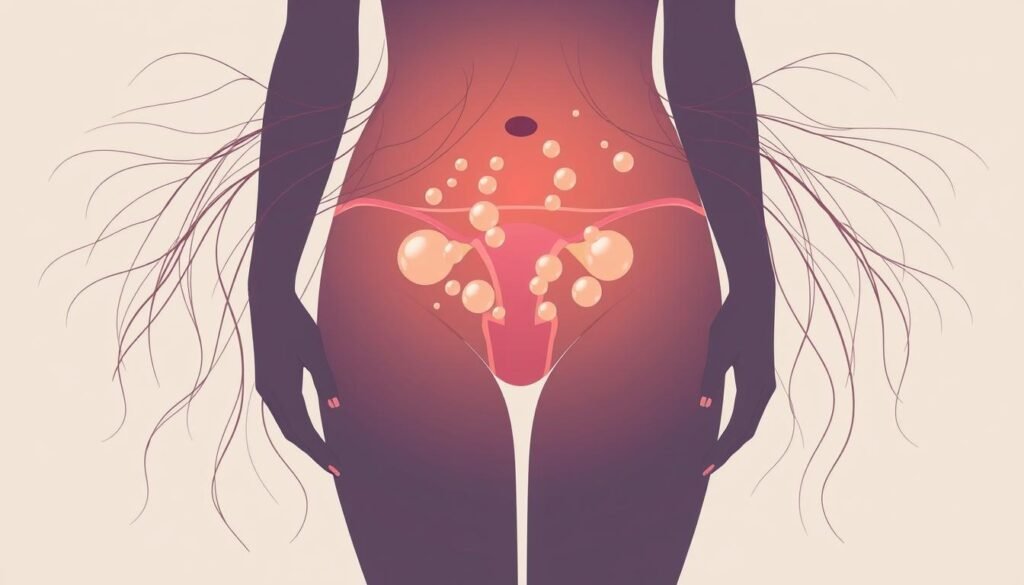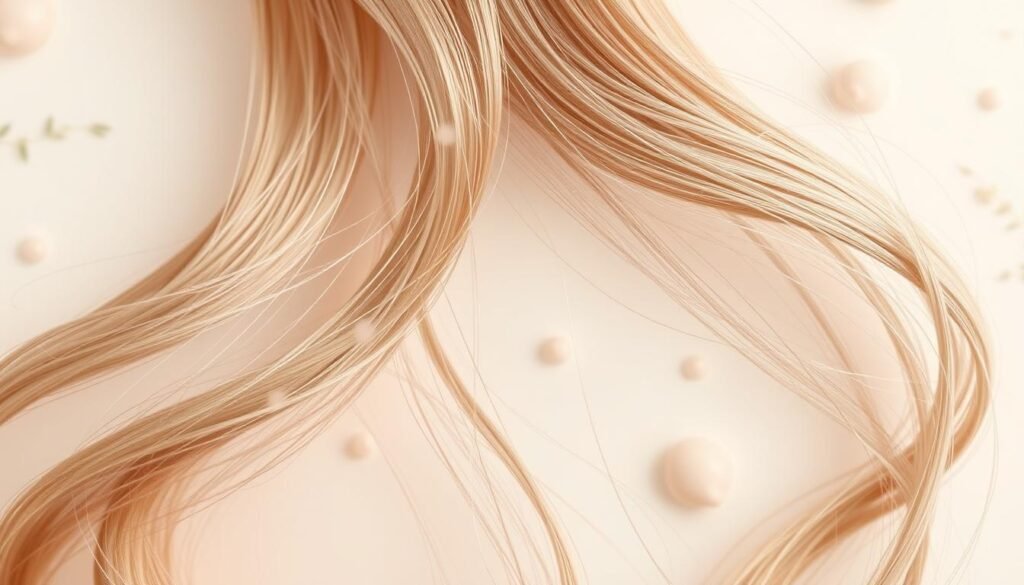About 1 in 10 teenage girls and women in their childbearing years face a diagnosis of polycystic ovary syndrome (PCOS). This condition can have widespread effects, including severe hair loss. Despite its prevalence, over half of these women were unaware of their PCOS beforehand. Beyond causing irregular periods and fertility issues, this hormonal imbalance can also trigger hair loss from ovarian cysts.
For those struggling with hair loss, understanding the link to ovarian cysts is key. PCOS throws off hormone levels, affecting hair growth among other health aspects. It’s important for women to recognize how ovarian health and hair loss are connected. This piece highlights the relationship between ovarian cysts and hair loss, illuminating the contributing factors.
Key Takeaways
- PCOS affects 1 in 10 teenage girls and women of childbearing age.
- Hormonal imbalances due to ovarian cysts can significantly impact hair growth.
- Many women with PCOS are unaware of their condition until symptoms arise.
- Understanding the link between ovarian cysts and hair loss is essential for effective management.
- Treatment options are available to help manage symptoms, including hair loss.
- Recognizing early signs can lead to better health outcomes.
Understanding Ovarian Cysts
Ovarian cysts are quite common during the fertile years of a woman’s life. These cysts often come from the menstrual cycle and are called functional cysts. The types of ovarian cysts include follicular and corpus luteum cysts. These usually don’t cause any harm and go away on their own in a few cycles.
There are other cyst types that can be problematic. Dermoid cysts, cystadenomas, and endometriomas are called pathological cysts. They might get big and cause issues like ovarian torsion. Things like hormone changes, being pregnant, and endometriosis can make you more likely to get them. Obesity and smoking can increase these risks too.
Many women don’t know they have cysts because there are often no signs. If symptoms appear, they can include pain in the pelvis, feeling bloated, and menstrual shifts. Getting regular pelvic exams is important. It helps keep your ovaries healthy and catches any big changes early.
The following table provides an overview of different types of ovarian cysts:
| Type of Cyst | Description | Common Symptoms | Potential Complications |
|---|---|---|---|
| Functional Cysts | Include follicular and corpus luteum cysts, typically harmless. | Often none; may experience pelvic pain or bloating. | Rarely cause complications; usually resolve on their own. |
| Dermoid Cysts | Made up of different types of tissues like hair or skin. | Pelvic pain, bloating. | Cyst rupture, torsion. |
| Cystadenomas | Formed from ovarian tissue; can be filled with fluid or mucus. | Possible pressure symptoms, pelvic discomfort. | Can grow large, leading to torsion. |
| Endometriomas | Formed as a result of endometriosis; can be painful. | Chronic pelvic pain, painful intercourse. | Torsion, rupture, complications from endometriosis. |
Knowing about the types of ovarian cysts shows why regular checkups are key. They help you take care of your ovarian health. This allows you to handle any problems early.
The Role of Hormones in Hair Loss
Hormones play a big role in hair growth and health. A right balance is crucial for healthy hair. If this balance tips, it may cause hair loss. Conditions like polycystic ovary syndrome (PCOS) raise androgen levels. This can lead to androgenic alopecia. Around 24% of women face hair loss due to this issue. Older men see higher rates, with about 67% affected.
Estrogen and androgens impact hair follicles differently. Changes in hormone levels, especially during menopause and menstruation, can affect hair. Women may see their hair thinning or shedding more. This can be worsened by medicines that affect hormones. For example, combined oral contraceptives (COCs) lower androgen. This helps with hair loss symptoms in PCOS cases.
When it comes to treatment, the link between hormones and hair is clear. Rogaine (minoxidil) is a well-known solution for female pattern hair loss. It can make hair thicker after a year. Prescription drugs like spironolactone and finasteride focus on hormone-related hair loss. They show how knowing hormone levels can lead to good treatment choices.
| Condition | Hormonal Influence | Prevalence |
|---|---|---|
| Polycystic Ovary Syndrome (PCOS) | Increased androgen levels | Affects 5-10% of females |
| Androgenic Alopecia | Hormonal imbalance affects hair follicles | 24% in females, 67% in males |
| Menopausal Hair Thinning | Decreased estrogen | Common in aging females |
| Hair Growth Treatments | Hormonal regulation via medication | Varies by individual response |
Symptoms of Ovarian Cyst Hair Loss
Women with ovarian cysts often face symptoms of ovarian cyst hair loss. This may hurt how they see themselves and feel. You might see your hair thinning, your hair part getting wider, or bald spots.
Hair may fall out more, especially when you wash or style it. These signs often come from changes in hormones. Hair thinning is common, causing worry and frustration.
Hormonal shifts from ovarian cysts make hair less dense. You might notice your scalp more easily than before.
Hello! Here’s a quick guide on ovarian cyst symptoms and their effects on hair:
| Symptom | Description | Possible Impact on Hair |
|---|---|---|
| Hair Thinning | Gradual decrease in hair density | Can lead to less volume and visibility of scalp |
| Hair Shedding | Increased hair fall during daily activities | More noticeable hair loss after washing or brushing |
| Bald Spots | Localized areas of hair loss on the scalp | May cause confidence issues and distress |
Understanding symptoms of ovarian cyst hair loss helps women find help early. It’s key to know how hormone changes affect hair health. This way, they can manage these challenges better.
Causes of Hair Loss from Ovarian Cysts
Hormonal factors are a key link between ovarian cysts and hair loss. Knowing why hair loss happens from ovarian cysts can guide towards solutions. Polycystic Ovary Syndrome (PCOS) and hormonal imbalances are main reasons.
Polycystic Ovary Syndrome (PCOS)
PCOS affects about 1 in 10 women of childbearing age in the U.S. Many women with PCOS don’t show symptoms, but it still affects hair health. PCOS means higher male hormones, leading to thinner hair or increased hair on face and body. Doctors diagnose PCOS by looking for signs like irregular periods or cystic ovaries.
Hormonal Imbalances
Hormonal imbalances are critical in causing hair loss from ovarian cysts. These imbalances can disrupt the natural hair growth cycle, causing thinning or loss. Stress, gaining weight, and what you eat can make hormonal problems worse, leading to more hair loss. Making lifestyle changes and seeking medical help can improve hair loss symptoms.

Additional Factors Contributing to Hair Loss
Several factors can lead to hair loss, offering insight for those affected. Genetics and nutritional issues are key. Both play a big role in hair health.
Genetics and Family History
Your family’s history can predict hair loss chances. If relatives have thinning hair, your risk increases. About 30 million American women struggle with androgenetic alopecia, mainly starting between 50-70 years old. Knowing your family history helps in managing the condition early.
Nutritional Deficiencies
A balanced diet is crucial for preventing hair loss, especially with hormonal issues. Not getting enough iron, vitamin B12, and vitamin D affects hair growth. Eating foods high in these nutrients can combat hormonal impacts on hair.
Managing Hair Loss with Ovarian Cysts
Women dealing with hair loss from ovarian cysts have many strategies to help them. Making big lifestyle changes is key for better health. This might also help with hair thinning because of hormone issues.
It’s crucial to manage stress for hormone balance. Mindfulness, meditation, or yoga are great ways to do this. Regular exercise makes you feel better and controls weight, especially important for PCOS. Physical activities improve blood flow, which might help hair grow.
Proper hair care is also important. Use gentle, sulfate-free shampoos and cut down on heat styling. Nourishing treatments keep hair healthy. Eating right matters too since certain vitamins and minerals boost hair health. Vitamin D, biotin, and zinc are great for hair growth.

| Nutrient | Role in Hair Health | Sources |
|---|---|---|
| Vitamin D | Promotes hair follicle cycling | Fatty fish, fortified foods |
| Biotin | Supports keratin production | Eggs, nuts, whole grains |
| Zinc | Repairs hair tissues and regulates hormones | Meat, shellfish, beans |
| Iron | Prevents hair loss due to deficiency | Red meat, lentils, spinach |
By making these changes to their lifestyle and hair care, women can improve their life and hair health.
Treatment for Ovarian Cyst Hair Loss
Tackling hair loss from ovarian cysts calls for a tailored approach. It’s all about finding the right treatment for each person. Knowing the medicines and topical solutions out there helps those affected take control.
Medication Options
Medicines often aim at fixing hormonal imbalances that fuel ovarian cysts and hair loss. Spironolactone is a go-to because it lowers androgen levels, cutting down hair loss. Finasteride is another option, stopping testosterone from turning into DHT, which is key in fighting androgenetic alopecia.
Women should talk to their doctors before jumping into these treatments. It’s vital to make sure the treatment fits their health and tackles their specific problems.
Topical Treatments
Applying treatments like minoxidil directly to the scalp can slow hair loss and kickstart new growth. It’s especially useful for women wrestling with androgenetic alopecia tied to ovarian cysts. Even though just a few see new hair with minoxidil, it’s still a top choice for handling hair thinning.
Looking into combined treatment plans can be a smart move. Pairing medication with topical applications may boost the outcomes and tackle hair loss on multiple fronts.
| Treatment Type | Example | Benefits |
|---|---|---|
| Medication | Spironolactone | Reduces androgen levels |
| Medication | Finasteride | Blocks DHT production |
| Topical Treatment | Minoxidil | Encourages hair growth |
Best Practices for Hair Care with Ovarian Cysts
Women facing hair loss from ovarian cysts can follow certain hair care methods. These methods help in having healthier hair and reducing hair fall. Using a gentle shampoo designed for sensitive scalps helps improve hair health.
- Limit heat styling to avoid unnecessary damage to hair.
- Regular trims help eliminate split ends, fostering a healthier appearance.
- Incorporate natural oils like black seed oil, which has shown a 76% reduction in hair fall in recent studies.
- Peppermint oil can stimulate hair growth within two weeks, enhancing the overall hair care routine.
A healthy scalp is crucial for hair growth. PCOS can cause menstrual and hormonal imbalance, influencing hair growth. A balanced diet full of vitamins keeps hair strong. Biotech is recommended for its benefits on hair affected by ovarian cysts.
Using masks rich in nutrients, like egg masks, provides essential vitamins and minimizes breakage. Marula oil helps repair damaged hair follicles to stop more breakage. For those looking into the emotional aspects of hair health, check out this insightful resource.

Following these tips not only targets hair loss physically but also aids emotional health. It shows the link between mental wellness and maintaining a good hair care routine.
| Hair Care Practice | Benefits |
|---|---|
| Gentle Shampoo | Milder on scalp and reduces irritation. |
| Regular Trims | Prevents split ends and promotes healthy growth. |
| Natural Oils | Moisturizes hair and strengthens follicles. |
| Egg Masks | Nourishes hair and reduces breakage. |
| Balanced Diet | Provides necessary nutrients for hair strength. |
Prevention Tips for Ovarian Cyst Related Hair Loss
To prevent hair loss from ovarian cysts, embrace a healthy lifestyle. Focus on eating well. Ensuring your diet has all the needed nutrients is key to handling Polycystic Ovary Syndrome (PCOS) troubles. Add foods rich in omega-3, lean proteins, and lots of veggies for better health.
Avoid foods and drinks that cause inflammation, like processed snacks and sugary beverages. These might make PCOS symptoms worse.
Seeing your doctor regularly is important for catching and dealing with ovarian cysts early. Keeping up with your health helps fight PCOS-related hair loss. Keeping a healthy weight, with a BMI between 18.5 to 24.9, also lessens hormone issues.
Here are some useful prevention tips for ovarian cyst related hair loss:
- Engaging in regular physical activity to support weight management.
- Staying hydrated and opting for low-sugar beverages.
- Reducing stress through techniques like yoga or meditation.
- Prioritizing sleep to allow for optimal body function and recovery.
To further boost health and lower hair loss risks, look into PCOS dietary guides. These recommend a Mediterranean diet. Combining diet, lifestyle adjustments, and check-ups can enhance well-being and reduce hair loss risk.
Understanding the Link Between Ovarian Cysts and Hair Loss
Hormonal imbalances and hair loss are closely connected, especially with ovarian cysts. Many women are affected by this issue. Conditions like Polycystic Ovary Syndrome (PCOS) mess with hormonal balance. This often leads to hair loss among other symptoms.
Women with PCOS may also struggle with weight gain, irregular periods, and too much hair growth. All these are signs of major health issues. They show how our health is deeply connected.
Different types of ovarian cysts exist, and they affect women differently. Dermoid cysts usually occur in younger women. Cystadenomas might become cancerous, posing serious risks. Functional cysts are mostly harmless but can upset hormone levels. Understanding these cysts helps women manage their health better.
Coping with Hair Loss Due to Ovarian Cysts
Dealing with hair loss from ovarian cysts is tough. It often causes emotional pain for many women. Getting emotional support is critical during this time. Joining support groups or seeking counseling helps overcome feelings of being alone. They provide comfort and shared stories with others.
Adopting hair loss strategies is a must for handling this condition. Working out not only keeps you fit but also boosts blood flow. This helps bring more nutrients and oxygen to your scalp. Eating right is equally important; foods rich in vitamins A, B7, B12, C, D, and minerals like iron and zinc are good for your hair. Natural treatments such as onion juice and black seed oil could also help reduce hair loss and promote hair growth.
It’s not just about what you eat. Scalp massage is a simple way to get more blood to your hair roots. This can help your hair stay in its growth phase longer. Choosing the right shampoos and conditioners is essential for keeping your hair clean and undamaged.
Here’s a quick list of helpful coping strategies:
| Strategy | Description |
|---|---|
| Exercise | Improves circulation to the scalp, promoting hair growth. |
| Dietary Changes | Increasing vitamins A, B, C, D, iron, and zinc supports hair health. |
| Scalp Massage | Encourages blood flow, potentially increasing hair growth. |
| Natural Remedies | Onion juice and black seed oil can reduce hair fall. |
| Consultation | Engaging with a healthcare professional for personalized strategies. |
Conclusion
Understanding how ovarian cysts and hormones affect hair is key for women. Conditions like PCOS cause hormonal changes that can hurt hair health. By dealing with these issues, women can better manage symptoms and maybe stop hair loss.
Many women don’t know about ovarian cysts’ effects on hair. About 27% of women in their childbearing years have PCOS. But many don’t know they have it. It’s vital to educate women so they can care for their hair and health.
Trying proven methods can help with ovarian cyst hair loss. This can be through medicine, changing life habits, or getting professional help. To learn more about hair loss linked to health issues, check out this resource. Remember, working on hormonal balance can make a big difference in hair health.